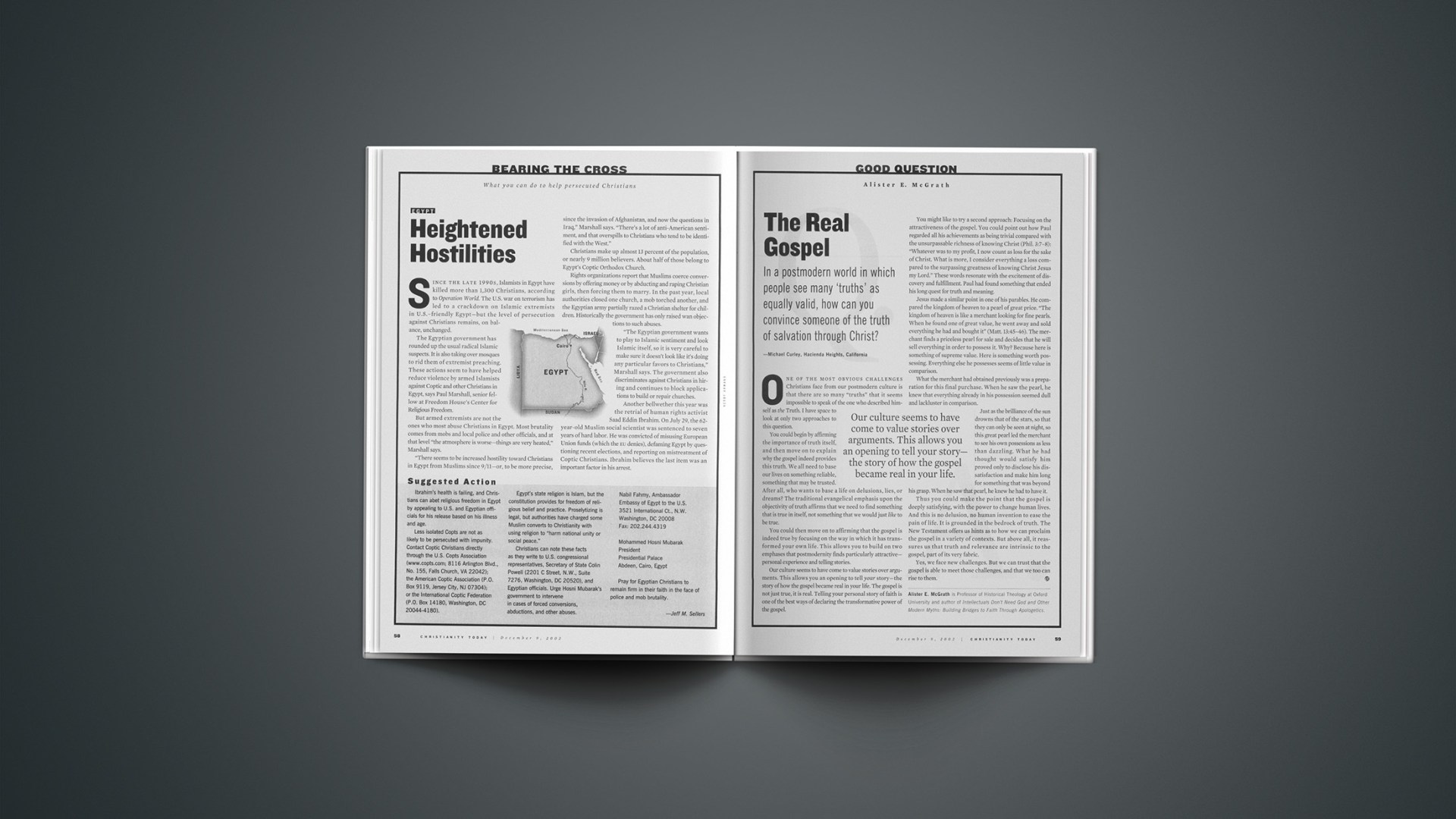Since the late 1990s, Islamists in Egypt have killed more than 1,300 Christians, according to Operation World. The U.S. war on terrorism has led to a crackdown on Islamic extremists in U.S.-friendly Egypt—but the level of persecution against Christians remains, on balance, unchanged.
The Egyptian government has rounded up the usual radical Islamic suspects. It is also taking over mosques to rid them of extremist preaching. These actions seem to have helped reduce violence by armed Islamists against Coptic and other Christians in Egypt, says Paul Marshall, senior fellow at Freedom House’s Center for Religious Freedom.
But armed extremists are not the ones who most abuse Christians in Egypt. Most brutality comes from mobs and local police and other officials, and at that level “the atmosphere is worse—things are very heated,” Marshall says.
“There seems to be increased hostility toward Christians in Egypt from Muslims since 9/11—or, to be more precise, since the invasion of Afghanistan, and now the questions in Iraq,” Marshall says. “There’s a lot of anti-American sentiment, and that overspills to Christians who tend to be identified with the West.”
Christians make up almost 13 percent of the population, or nearly 9 million believers. About half of those belong to Egypt’s Coptic Orthodox Church.
Rights organizations report that Muslims coerce conversions by offering money or by abducting and raping Christian girls, then forcing them to marry. In the past year, local authorities closed one church, a mob torched another, and the Egyptian army partially razed a Christian shelter for children. Historically the government has only raised wan objections to such abuses.
“The Egyptian government wants to play to Islamic sentiment and look Islamic itself, so it is very careful to make sure it doesn’t look like it’s doing any particular favors to Christians,” Marshall says. The government also discriminates against Christians in hiring and continues to block applications to build or repair churches.
Another bellwether this year was the retrial of human rights activist Saad Eddin Ibrahim. On July 29, the 62-year-old Muslim social scientist was sentenced to seven years of hard labor. He was convicted of misusing European Union funds (which the EU denies), defaming Egypt by questioning recent elections, and reporting on mistreatment of Coptic Christians. Ibrahim believes the last item was an important factor in his arrest.
Earlier this month Ibrahim was released after Egypt’s highest appeals court ordered a retrial, nullifying the 7-year sentence. The country’s highest court will begin a new trial on Jan. 7, 2003.
Suggested Action
Christians can abet religious freedom in Egypt by appealing to U.S. and Egyptian officials for Ibrahim’s acquittal.
Less isolated Copts are not as likely to be persecuted with impunity. Contact Coptic Christians directly through the U.S. Copts Association (www.copts.com; 8116 Arlington Blvd., No. 155, Falls Church, VA 22042); the American Coptic Association (P.O. Box 9119, Jersey City, NJ 07304); or the International Coptic Federation (P.O. Box 14180, Washington, DC 20044-4180).
Egypt’s state religion is Islam, but the constitution provides for freedom of religious belief and practice. Proselytizing is legal, but authorities have charged some Muslim converts to Christianity with using religion to “harm national unity or social peace.”
Christians can note these facts as they write to U.S. congressional representatives, Secretary of State Colin Powell (2201 C Street, N.W., Suite 7276, Washington, DC 20520), and Egyptian officials. Urge Hosni Mubarak’s government to intervene in cases of forced conversions, abductions, and other abuses.
Nabil Fahmy, Ambassador
Embassy of Egypt to the U.S.
3521 International Ct., N.W.
Washington, DC 20008
Fax: 202.244.4319
Mohammed Hosni Mubarak
President
Presidential Palace
Abdeen, Cairo, Egypt
Pray for Egyptian Christians to remain firm in their faith in the face of police and mob brutality.
Copyright © 2002 Christianity Today. Click for reprint information.
Related Elsewhere
The 2002 International Religious Freedom Report says, “The Constitution provides for freedom of belief and the practice of religious rites; however, the Government places restrictions on this right.”










